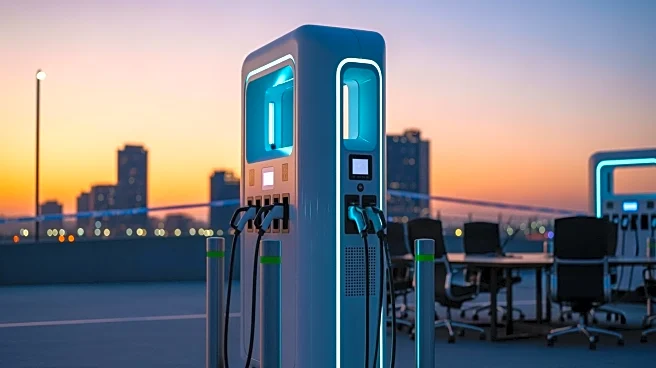What's Happening?
Rivian Automotive, an electric vehicle manufacturer, has seen its stock value decline significantly since its initial public offering (IPO) in November 2021. The company, which was initially backed by Amazon and Ford, has faced supply chain issues, factory
shutdowns, and increased competition, leading to a reduction in production and delivery rates. Despite these challenges, Rivian has managed to double its production in 2023 compared to 2022, but its growth has slowed due to inflation, high interest rates, and reduced EV subsidies. The company is preparing to launch its R2 SUV in 2026, which is expected to drive future growth.
Why It's Important?
Rivian's struggles highlight the volatility in the electric vehicle market, where companies face intense competition and macroeconomic pressures. The decline in Rivian's stock value reflects broader challenges in the industry, including supply chain disruptions and fluctuating consumer demand. As Rivian attempts to stabilize its production and expand its offerings, its performance will be closely watched by investors and industry stakeholders. The company's ability to overcome these hurdles and capitalize on its upcoming R2 SUV launch will be crucial for its long-term success and could influence investor sentiment in the EV sector.
What's Next?
Rivian plans to launch its R2 SUV in 2026, which is expected to boost its revenue and production capacity. Analysts predict a 32% increase in revenue for 2026, driven by the new model and improved sales of existing vehicles. The company is also working on a joint venture with Volkswagen to develop new EV architecture and software. Rivian's future growth will depend on its ability to scale production, stabilize sales, and successfully launch new models. The upcoming launch of the R2 SUV will be a critical test for Rivian, potentially impacting its market position and investor confidence.
Beyond the Headlines
Rivian's situation underscores the challenges faced by new entrants in the EV market, where established players like Tesla dominate. The company's reliance on strategic partnerships and its ability to innovate will be key factors in its success. Rivian's efforts to improve supply chain efficiency and reduce dependency on third-party suppliers are steps towards achieving sustainable growth. The broader implications for the EV industry include the need for companies to adapt to changing economic conditions and consumer preferences, as well as the importance of technological advancements in maintaining competitiveness.
















